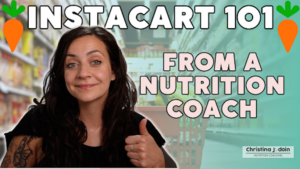We get a lot of questions about nutrition. They’re varied: from young athletes curious about the best supplements, to middle-aged men and women who want to get off blood pressure meds, to individuals who want to feel good and shed some fat.
Truth is, it’s hard answering them all. There are different schools of thought, lots of conflicting advice, and so many trendy promises to solve every problem. It’s tough coming up with definitive advice that takes into account the context and nuance of each particular client. There’s no one-size-fits-all solution. A helpful response for a college athlete could be detrimental for a 30-year-old mom. While there may be no right answer, there are correct principles, at least from our perspective. Our goal is to give you sound information so that you can then ask more questions and make informed decisions.
We do not represent ourselves as registered nutritionist but we have a lot of practical advice that is proven to be helpful to our clients and we also rely heavily on the trusted experts at
Precision Nutrition
for the facts to support our advice. Here are answers to a few of the most common questions we get:
“Where do I start?”
You don’t need a major overhaul on day one. You don’t need to “go Paleo” or “eliminate sugar”. You just need to fix major nutrient or vitamin deficiencies. Until these are fixed, bodies’ simply won’t function correctly in most cases.
I know this is counter to what you often hear, but rather than eliminating things from your diet right away, try adding some things into it.
This means that, for most clients, making sure they get a
bit more protein, enough vitamins and minerals, added healthy fats, and more water
will get their bodies working better in no time.
You don’t have to tackle all that at once, you probably shouldn’t. Instead, you should pick the biggest limiting factor experiencing and start there.
If you have one or two glasses of water a day, this is probably a good place to start. If vegetables are absent from each of your meals, that is a good place to start to up your vitamins and minerals.
Many of us don’t really know what we eat throughout the day.
That is why we ask lots of questions to our new clients and have them fill out a 3 Day Food Log so we can truly see what is happening.
We recommend making changes slowly and systematically.
One thing at a time
has proven to be successful.
“Do I need to count calories?”
Weight management at face value is a pretty simple equation. Eat more calories than you burn, and you gain weight. Eat fewer calories than you burn, and you lose weight. Except it is not that simple and counting calories isn’t easy, never mind the quality of the calories.
Calorie counting is imprecise.
Plus it’s annoying and for most of us not realistic to weigh, measure, and count all your food. There’s an easier way. We recommend the Precision Nutrition approach beginning with hand-size portion estimating instead.
Here how it works:
– Your
palm
determines your
protein
portions
– Your
fist
determines your
veggie
portions
– Your
cupped hand
determines your
carb
portions
– Your
thumb
determines your
fat
portions
This system counts your calories for you, and gets your macronutrients lined up too, without having to do any fancy kitchen math. Plus, your hands are portable—they go wherever you go, making portion-sizing very convenient. In addition, your hands are generally scaled to your size—the bigger you are, the bigger your hands, the more food you need and the more food you get, and vice versa.
Check out this great infographic from Precision Nutrition
for more info
.
This system works, it is not intended to be perfect but it certainly creates clear guidelines and helps decision making.
“Should I avoid carbs?”
Ask almost any client what they need to do to lose a few pounds, and they’ll probably say: “Cut back on the carbs.”
However,
most of us would do best eating a
moderate
amount of quality carbs
—whole grains, fruit, potatoes, sweet potatoes, beans and legumes, etc. (We emphasize moderate, of course).
For men, this usually means about 1-2 handfuls per meal. And women, about ½-1 handful per meal. Of course, the needs of each actual client may differ, based on their activity level, goals, and genetics. But, bottom line, carbs are not inherently fattening, especially whole food sources. And getting adequate carbs can help most clients exercise harder and recover better, optimizing progress.
The quality of the carbs may be the more important consideration than whether or not to eat them. If you are not preparing to walk across the stage in your swimsuit, carbs sourced from real food (not from a bag or box) will help your cause.
“Should I do a detox or juice cleanse?”
Cleansing tends to bring out extreme opinions. But, as with most areas of nutrition (and life), rigidly clinging to any extreme position may blind us to some important information.
The fact is, there can be many problems with detoxes and cleanses:
– Protein deficient
– Extremely low calories
– Blood sugar swings
– GI tract dysfunction
– Restrictive eating and deprivation
If doing a juice cleanse or detox diet helps you get ready to make further helpful and sustainable changes in their life that can be ok. However, we prefer
helping them build life-long skills and incorporate daily practices
to improve their health, performance, and body composition without extreme (and unsustainable) things like detoxes and cleanses.
Let’s Get Started!
These are only a few of the many important questions we are asked and only the start to answering these. Undoubtedly there is no single solution or right diet. We can confidently say this though:
Everyone has somewhat different needs depending on factors such as age, gender, activity level, goals, health and their current situation.
If you are looking for a quick fix, you are likely going down the wrong road. If you think making major changes will not be challenging, you’re probably mistaken. Addressing common deficiencies, primarily water, protein, essential vitamins and minerals, is a good place to start.
Food should make you feel good and any changes you make to your food that are wise changes should make you feel better.




